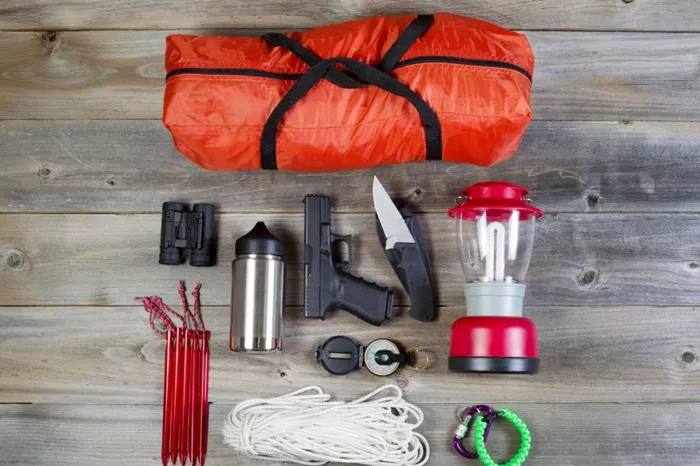Wild camping offers a unique way to connect with nature. It requires careful planning and the right gear to ensure a safe and enjoyable experience. This guide will help you pack everything you need for a successful trip.
1. Shelter and Sleeping Essentials
Tent
Choose a lightweight and durable tent. It should be easy to set up and capable of withstanding weather conditions. Make sure it has good ventilation and a waterproof rainfly.
Sleeping Bag
Pick a sleeping bag suitable for the season. Look for bags with temperature ratings that match the weather conditions of your destination. A compact and insulated sleeping bag works best for wild camping.
Sleeping Pad
A sleeping pad adds comfort and insulation. It keeps you warm by preventing body heat from escaping into the ground. Self-inflating or foam pads are good options.
Tarp or Groundsheet
Bring a tarp or groundsheet to place under your tent. This adds an extra layer of protection against moisture and sharp objects.
2. Cooking and Eating Gear
Portable Stove
A portable camping stove is essential for cooking meals. Choose a lightweight and fuel-efficient model. Make sure you bring enough fuel for your trip.
Cookware
Carry a compact cooking set that includes a pot, pan, and utensils. Look for items made of lightweight materials like aluminum or titanium.
Utensils and Tools
Pack a spork, knife, and a multi-tool. These items are versatile and help with meal preparation and other tasks.
Food
Bring lightweight and non-perishable food items. Some good options include instant noodles, freeze-dried meals, energy bars, oatmeal, nuts, and dried fruits.
Water and Filtration
Carry enough water for your trip. If you’re camping near a water source, bring a water filter or purification tablets to ensure safe drinking water.
Bear-Proof Food Container
In areas with wildlife, store your food in a bear-proof container or hang it from a tree to keep animals away.
3. Clothing and Footwear
Layered Clothing
Pack clothes that can be layered. This allows you to adjust to varying temperatures. Include a moisture-wicking base layer, an insulating mid-layer like a fleece or down jacket, and a waterproof and windproof outer layer.
Hiking Boots
Wear sturdy and comfortable hiking boots. Ensure they are broken in before your trip to avoid blisters.
Socks and Gloves
Bring moisture-wicking socks to keep your feet dry. Carry gloves for warmth, especially in cooler climates.
Hat and Buff
A wide-brim hat protects you from the sun, while a buff or beanie keeps you warm at night.
Rain Gear
Carry a lightweight rain jacket and rain pants. These will keep you dry during unexpected showers.
4. Navigation and Safety Gear
Map and Compass
Always carry a detailed map of the area and a compass. Learn how to use them for navigation.
GPS Device
A GPS device or smartphone with offline maps can be a helpful backup for navigation.
First Aid Kit
Pack a basic first aid kit with bandages, antiseptic wipes, pain relievers, tweezers, and any personal medications.
Headlamp
A headlamp is crucial for hands-free lighting at night. Bring extra batteries as a backup.
Whistle
A whistle can help you signal for help in emergencies. It’s lightweight and easy to carry.
Personal Locator Beacon
In remote areas, a personal locator beacon can send a distress signal to emergency services.
Knife or Multi-Tool
A sturdy knife or multi-tool is essential for various tasks, from cutting rope to opening packaging.
5. Personal Items and Hygiene
Toiletries
Bring biodegradable soap, a toothbrush, toothpaste, and a small towel. Use eco-friendly products to minimize your impact on the environment.
Toilet Paper and Trowel
Carry toilet paper and a small trowel. Use the trowel to dig a hole for waste, and always follow Leave No Trace principles.
Sunscreen and Bug Spray
Protect yourself from sunburn and insect bites. Choose a sunscreen with a high SPF and a bug spray with DEET or natural ingredients.
Trash Bags
Pack out all trash, including food scraps. Use sealable bags to store waste securely.
Personal Identification
Carry your ID, permits, and any required documentation for camping in the area.
6. Survival and Emergency Gear
Emergency Blanket
An emergency blanket is lightweight and can keep you warm if the temperature drops unexpectedly.
Rope or Paracord
Rope or paracord is useful for setting up tarps, hanging food, or making repairs.
Duct Tape
Duct tape can fix tears in tents, sleeping bags, or clothing. Wrap a small amount around a water bottle to save space.
Fire-Starting Kit
Bring waterproof matches, a lighter, and fire starters. Practice building a fire before your trip.
Signaling Device
A mirror or small signaling device can help rescuers locate you in an emergency.
7. Entertainment and Extras
Books or Journal
Pack a lightweight book or a journal for writing. These can help you relax during downtime.
Camera
Capture the beauty of nature with a compact camera or smartphone.
Binoculars
Binoculars are great for birdwatching or exploring distant landscapes.
Cards or Small Games
A deck of cards or a small travel game can provide entertainment during quiet evenings.
8. Packing Tips for Efficiency
Backpack
Choose a backpack with enough capacity for all your gear. It should have padded straps and a hip belt for comfort.
Pack Weight
Keep your pack weight below 20% of your body weight. Prioritize lightweight and multipurpose items.
Packing Order
Place heavier items close to your back. Keep frequently used items, like snacks and maps, in accessible pockets. Store your sleeping bag and clothes in waterproof bags.
Final Thoughts
Wild camping is an adventure that requires preparation and the right gear. By packing thoughtfully and following this guide, you can enjoy a safe and memorable experience. Always respect nature, follow local regulations, and leave no trace. Happy camping!
Related topics
- hat to Pack for a Week of Camping: A Detailed Guide
- Best Things to Cook Over a Fire
- What to Cook Over Open Fire: A Complete Guide

